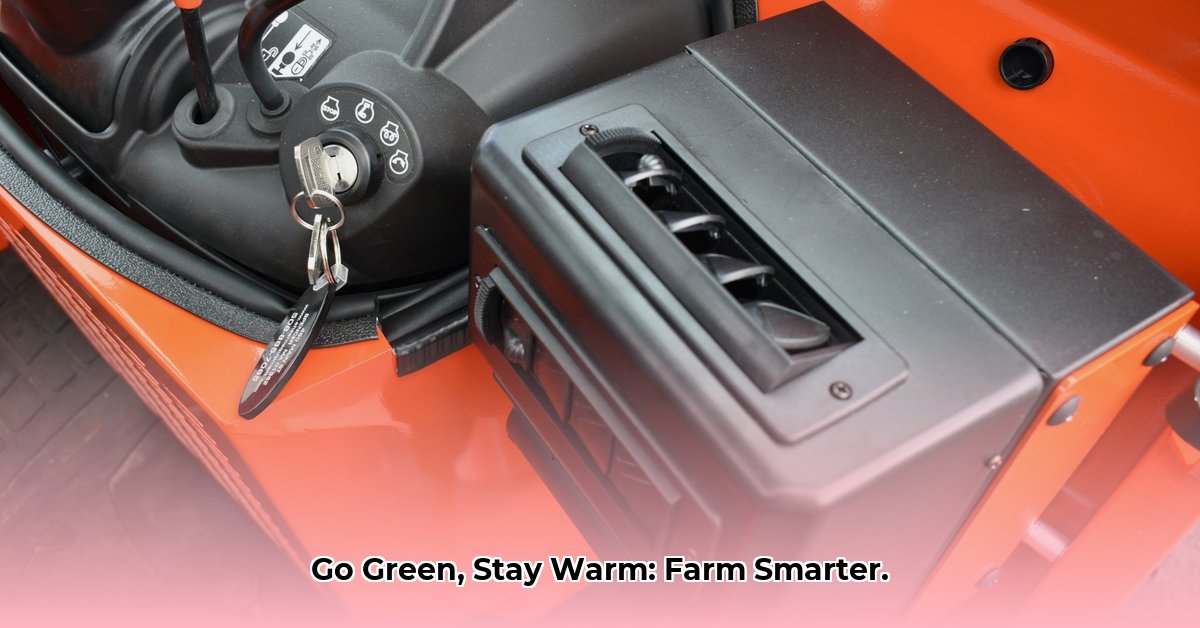
Heater for Tractor: Keeping Warm and Green on the Farm
Farming demands dedication, and long hours in harsh weather conditions shouldn't compromise operator well-being. A warm tractor cab is crucial for both comfort and productivity. However, traditional heating systems often rely on fossil fuels, contributing significantly to greenhouse gas emissions. This article explores sustainable alternatives, balancing operator comfort with environmental responsibility and economic viability. It's time to find the sweet spot where a warm cab meets a green conscience.
Choosing the Right Tractor Cabin Heater: A Practical Guide
Selecting the optimal tractor heater requires careful consideration of several factors: climate, budget, access to renewable energy sources, and environmental impact. Let's weigh the pros and cons of several established and emerging technologies.
Fuel-Burning Heaters: The Tried and True (But Not Always Green)
Fuel-based heaters (diesel or propane) offer reliable, powerful heat, readily available and simple to install. However, their environmental cost is significant.
| Feature | Pros | Cons |
|---|---|---|
| Heat Output | Powerful, consistent heat in harsh conditions | Can vary widely depending on make and model. |
| Fuel Efficiency | Can be high in certain models | Generally lower than electric alternatives; higher running costs. |
| Environmental Impact | High greenhouse gas emissions; air pollution | Significant carbon footprint; not suitable for eco-conscious farmers. |
| Initial Cost | Relatively inexpensive | Ongoing fuel costs add up significantly. |
| Installation | Typically straightforward | May require adjustments for proper ventilation. |
| Maintenance | Generally straightforward | Potential for breakdowns and repair expenses. |
Actionable Advice: Fuel-based heaters remain viable in areas with limited electricity access, but consider fuel efficiency ratings and explore potential for waste heat recovery.
Electric Heaters: Clean Energy, If Your Grid is Green
Electric heaters offer a cleaner alternative, provided the electricity source is renewable (solar, wind). However, limited power availability remains a constraint on many farms.
| Feature | Pros | Cons |
|---|---|---|
| Heat Output | Efficient warmth in milder climates; quieter operation. | Lower heat output compared to fuel-based systems; dependent on power source. |
| Fuel Efficiency | Excellent if powered by renewables; minimal running costs. | Highly dependent on electricity source; high costs with non-renewable power. |
| Environmental Impact | Low emissions with renewable energy; significant impact with fossil fuels | Environmental impact directly tied to the electricity grid's carbon footprint. |
| Initial Cost | Usually more expensive than fuel-based heaters. | Wiring and installation might require professional assistance. |
| Installation | Can be more complex; may need professional electrical work. | Requires a reliable power connection, potentially necessitating upgrades. |
| Maintenance | Typically low maintenance. | Malfunctions may necessitate specialized repairs. |
Actionable Advice: Prioritize electric heaters only if powered by renewable sources. Consider solar panel integration or on-site wind generation.
Waste Heat Recovery Systems: The Future of Sustainable Heating
Waste heat recovery systems offer immense potential by utilizing the tractor's engine heat. While still under development, this technology promises significant fuel savings and reduced emissions. Experts anticipate this becoming a game-changer in sustainable tractor heating.
Sustainable Practices: Eco-Friendly Heating Hacks
Minimizing the environmental impact of tractor cab heating is achievable through strategic approaches:
Optimize Cab Insulation: Improved insulation (e.g., Armaflex, FEHR systems) drastically reduces heat loss, lowering energy demands. This is a crucial first step regardless of heater choice.
Implement Waste Heat Recovery: Harnessing engine waste heat offers promising potential for reduced fuel consumption and emissions.
Integrate Renewable Energy: Pairing electric heaters with solar or wind power creates a truly sustainable heating system.
Perform a Lifecycle Assessment: Analyze the complete environmental impact of each heater type, from manufacturing to disposal. This holistic view helps informed decision-making.
The Economics of Sustainable Tractor Heating: Return on Investment (ROI)
The financial implications are crucial. While operator comfort boosts productivity, the initial cost, running expenses (fuel or electricity), maintenance, and potential productivity gains must all factor into the decision. A high-efficiency system might offer long-term cost savings, despite a higher upfront price.
Future Trends and Innovations
Advancements in tractor cab heating are transformative:
- More efficient heating elements: Reducing energy consumption without sacrificing heat output.
- Smart controls: Optimizing energy use based on various factors (temperature, operator preferences). AI-driven systems are increasingly likely.
- Precision agriculture integration: Combining heating systems with other farm technologies for enhanced overall efficiency.
Conclusion: A Warm Cab, a Green Future
The ideal tractor heater hinges on various factors, necessitating a customized approach. The future of sustainable agriculture demands responsible heating solutions. By carefully considering these factors, farmers can make informed decisions that enhance operator well-being, boost productivity, and contribute to a greener future. Collaboration among manufacturers, researchers, and policymakers is essential to accelerate the adoption of sustainable heating technologies.